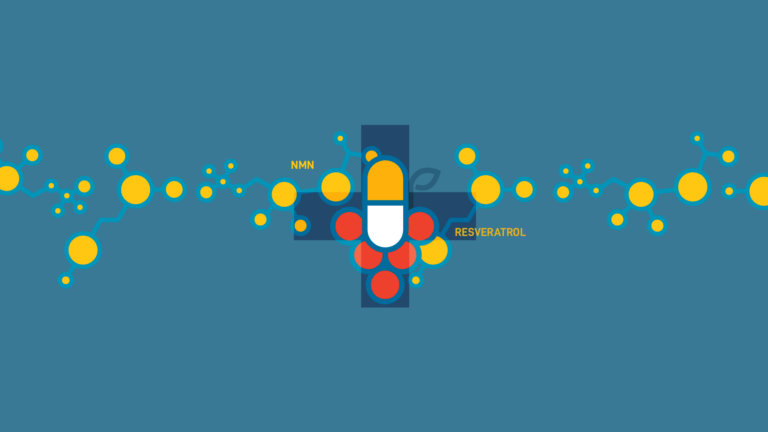Red wine is good for your heart, or so the saying goes. And it’s true to some degree, thanks to an interesting plant compound known as resveratrol. This polyphenol is found in over 70 plant species and predominantly in the skin and seeds of grapes. And, resveratrol offers a variety of health benefits.
What is resveratrol?
In plants, resveratrol is produced under stress. It’s a phytoalexin, or a protective substance generated when a plant is trying to fend off fungal attacks or protect itself from drought or harmful UV rays. The molecule serves as a defense mechanism to safeguard a plant’s health. And the million-dollar question is… does the same apply to humans?
The application of resveratrol has been challenging, thanks to its poor solubility and bioavailability, and even adverse effects in some instances. The key is mastering the dose and pairing it with the ingredients found in Youngr™ NMN for supercharged health effects.
Resveratrol bioavailability
But it’s not all sunshine and red wine. Diving into the world of resveratrol, you might have heard that mixing it with fats could boost its effects, kind of like adding a turbocharger. We’ve turned every page of research, looking at studies like this one and that one, to get to the heart of the matter. And here’s the interesting bit: the results are a mixed bag. Even a standout human trial showed that this ‘turbocharging’ with fats might not be necessary after all.
Here at Wonderfeel, we’re all about peeling back the layers to get to the truth. While some suggest that pairing resveratrol with fats might enhance its absorption, we at Wonderfeel decided not to emphasize this idea. We’re focused on uncovering and adhering to the most effective methods, always informed by the latest research. We’re all about following the science, and as it keeps evolving, we’ll keep you in the loop with the latest and most trustworthy info.
Read on for a closer look at the varied health benefits of resveratrol, plus the most effective way to get them.
Skin health and resveratrol: More than just repair
Enhancing skin protection and reducing inflammation
Resveratrol benefits the skin in several ways. It increases collagen production, reduces damage from antioxidants, and improves elasticity and thickness. It can also help repair scars and marks.
Beyond its anti-aging effects, resveratrol strengthens the skin’s natural defenses. By stimulating keratinocyte differentiation and antimicrobial peptide expression, it enhances the skin’s protective barrier. Resveratrol also helps to soothe skin conditions like psoriasis and eczema by reducing inflammation.
Moreover, resveratrol offers comprehensive skin protection. Its UV-shielding properties help guard against sun damage, while its antioxidant activity contributes to overall skin health. By preventing the breakdown of collagen and elastin, it helps maintain skin structure and firmness.
Anti-aging and hyperpigmentation benefits of resveratrol
Resveratrol helps protect and repair skin cells by activating special proteins called SIRT1 and Nrf2. These proteins are like bodyguards for your skin cells, allowing cellular protection and antioxidant defense.
Resveratrol also controls a process called melanogenesis. By controlling melanin production, resveratrol can help reduce hyperpigmentation, such as dark spots, freckles, and uneven skin tone. This powerful antioxidant seems to be like a Swiss Army Knife. It supports collagen, hydrates, and protects skin from damage. By targeting inflammation and pigmentation, resveratrol helps create a smoother, more even complexion.
Wonderfeel Youngr™ NMN complements resveratrol’s benefits by enhancing skin hydration, elasticity, and protection from environmental stressors.
The broader health benefits of resveratrol
The suggested list of benefits is lengthy and impressive—resveratrol is an anti-inflammatory, an anti-carcinogenic, a cardioprotectant, a neuroprotectant, and the list goes on. One peer-reviewed paper notes that resveratrol has been used for blood pressure, stomach ache, hepatitis, arthritis, urinary tract infections, fungal diseases, and skin inflammation treatment.
Moving on, we have resveratrol’s anti-cancer activity. There is evidence that resveratrol may be an effective compound for helping treat and prevent several kinds of cancer (including breast cancer). It works at all three stages of carcinogenesis, or the process during which normal cells become cancerous, by modulating the pathways that control the division and growth of cells. It can also influence gene expression in cancer cells, which inhibits growth, and it may interfere with the expression of certain hormones, which could limit the spread of hormone-dependent cancers. Again, more clinical trials are needed, but what we know so far is pretty exciting.
Then there are potential cardioprotective benefits of resveratrol. In this capacity, it’s described as a therapeutic agent with what researchers call a novel mechanism of action that appears to benefit a variety of conditions related to cardiovascular disease and heart failure.
Finally, you can’t talk about resveratrol without touching on sirtuins. Among its many admirable qualities is resveratrol’s ability to activate sirtuins, which are a group of seven protein enzymes directly associated with cellular health regulation and longevity in mammals. Specifically, resveratrol triggers the SIRT-1 sirtuin, a process that creates a beneficial antioxidant effect. In turn, we see boosted insulin sensitivity and muscular and nervous system support. Actually, this potent polyphenol is probably the most researched of the known sirtuin boosters – it’s a pretty big deal, and it is the primary reason the Wonderfeel formula includes resveratrol.
Resveratrol: The antioxidant powerhouse in grapes
Plenty of research suggests that resveratrol does quite a bit to benefit the human body. First up are the potent antioxidant properties. Numerous studies have demonstrated that the potential here is impressive, and much of that can be credited to resveratrol’s ability to act as both a direct antioxidant and what researchers describe as an indirect cellular antioxidant system inducer. In other words, it’s working on multiple levels to scavenge free radicals and protect cells against oxidative stress. Happy side effects of resveratrol’s antioxidant properties are reduced blood pressure and a lowered risk of age-related cognitive decline, though more research is needed for definitive conclusions.

Resveratrol is a fat-soluble molecule and in principle taking it with dietary fat like yummy avocados could help with its absorption in the body.
How much resveratrol is beneficial?
Let’s start with tackling a rather controversial topic, and that’s the high-dose resveratrol trend promoted by some well-known biohackers.
Higher doses of resveratrol, while promising in some aspects, particularly in the fight against cancer cells, can potentially meddle with our cellular machinery. Throwing a wrench in the basic functions of our cells, too much of it can interfere with our genetic material, putting a damper on cell growth. Healing processes, so vital for our body’s regeneration and recovery, are disrupted. It even puts a hold on the creation of new blood vessels, a process known as angiogenesis, which is fundamental for our overall health and well-being. The culmination of these effects is what leads to cell death.
Why smaller doses of resveratrol can be more effective?
Studies have shown that resveratrol is something of a microscopic superhero at lower doses, fending off harmful cellular decay and numerous other benefits. It fortifies heart health by bolstering our cell survival proteins, giving our hearts a better chance to recover after blood supply disruptions. It also curbs heart cell damage and keeps the chemical balance steady in our bodies, minimizing heart injury.

These findings underline the heart of the controversy. While prominent biohacker and biologist David Sinclair advocates for high-dose resveratrol, science reminds us that it’s not a one-size-fits-all solution. Some people may experience benefits, but there could be significant drawbacks and the potential risks of too much resveratrol must be taken into account.
It’s crucial that we balance the allure of promising health hacks with careful consideration of the scientific evidence. At Wonderfeel, we embrace the power of knowledge – Youngr’s 100 mg dose of resveratrol per day is a nurturing force benefitting so many functions in the body. As always, it’s your journey, and you’re in the driver’s seat. And remember, the expedition to well-being is best undertaken with an air of thoughtful judgment and restrained indulgence.
Resveratrol and the French paradox
Think of French food, and richness comes to mind—bread, butter, cheese, pork, and lots of wine. Yet despite their indulgent diet, the French are notable for a relatively low rate of coronary heart disease. It’s charmingly called the French Paradox, and resveratrol is widely considered to be one of the main reasons. But resveratrol is part of another paradox. We know resveratrol’s health benefits are impressive, but accessing them isn’t always easy. Overall, more clinical studies with humans are needed to better understand how we can most effectively and safely use resveratrol.

In terms of safety, there is good news. In 2020, a paper highlighted the “need to appraise and investigate the adverse outcomes of resveratrol” because of “the high level of variability among all the different studies.” Plus, we can confirm that no major side effects were reported in long-term clinical trials investigating the effects of 350 mg/day to 700 mg day over a 12-month period. In fact, resveratrol has been found to be safe and well-tolerated at up to 5 g per day, with a multiple-day dosing schedule on healthy humans.
That was of particular importance to the Wonderfeel team, because resveratrol and NMN have a synergistic relationship. As mentioned above, resveratrol activates sirtuin genes and NMN fuels those genes to increase NAD levels that benefit the body. In Wonderfeel Youngr™, our newest iteration of the Wonderfeel NMN formula, we use just 100 mg of resveratrol to amplify the effects of our NMN and combine it all with ergothioneine, and hydroxytyrosol. So put down the red wine and pick up your daily serving of Wonderfeel Youngr™—no paradox here.
These statements have not been evaluated by the Food and Drug Administration. These products are not intended to diagnose, treat, cure, or prevent any disease.













